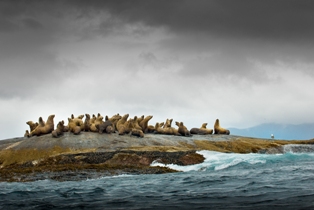
A recent ad campaign linked to a top oil sands firm questions what drives the work of West Coast Environmental Law.
One of Canada’s oldest environmental law organizations, West Coast Environmental Law has provided legal support to British Columbians to ensure their voices are heard on important environmental issues and worked to secure strong environmental laws for almost 40 years. Through our environmental legal aid services, citizens and community groups who could not otherwise afford it are able to participate meaningfully and democratically in decisions about resource development that have the potential to profoundly affect their lives.
Back in the ‘70s when a broad citizens’ coalition brought to a halt a proposed oil pipeline to an oil port at Kitimat, BC West Coast lawyers were there to support them. And we are there today for these northern communities as they once again face the threat of environmental devastation from oil pipelines and tankers.
Our belief remains strong today, as then, that our salmon-rich north Pacific coast and rivers should remain free from oil supertankers and the threat of oil spills. Repeated polling suggests that 75-80 percent of British Columbians agree with us. (While recent polling conducted for Enbridge indicates that project support exceeds project opposition, the majority of respondents were unfamiliar with the Enbridge project. Four past polls, most recently in the spring of 2011, confirm that when asked about a threat that they are familiar with –the risk of oil spills from oil tankers –British Columbians consistently agree that oil tanker traffic should be banned in BC’s inside coastal waters).
This goal, like the other long-term strategic priorities of West Coast Environmental Law is set by our board and staff, informed by the deep connections we have forged over many decades with communities in every corner of the province. Without the generosity of our supporters, including dedicated individuals and foundations on both sides of the border, the work of our non-profit charity to protect the environment through law would not be possible. But we, not our funders, decide what issues we will focus on.
Ultimately, the issue for Canadians is not whether funders outside our borders support West Coast’s work; after all, when disaster strikes, Canadians support charitable activities around the globe. Anyone who has ever seen images of the Exxon Valdez oil spill will not be surprised that people and organizations outside our borders care about safeguarding the globally significant Great Bear Rainforest from a similar fate.
A more important question to ask Canadians is what kind of legacy we want to leave for future generations. The threats posed to our current way of life from climate change are real and growing, and tar sands oil production, which will fill the Enbridge Northern Gateway pipeline, is Canada’s fastest growing source of greenhouse gas emissions. The pipeline will cross over 1,000 rivers and streams across northern BC –a major oil spill in one of BC’s renowned salmon rivers or in our sensitive coastal waters could wipe out not only jobs and livelihoods in the fishing and tourism industries, but the very foundation of First Nations cultures, economies and governance structures.
West Coast believes that it is time to set legal limits on greenhouse gas pollution and the most egregious fossil fuel projects, and hasten the transition to responsibly developed, renewable sources of energy. It is time for a dialogue about how we create a ‘greener economy’ that creates and sustains jobs for Canadians without environmental destruction. But this dialogue won’t happen if the corporate profits of multinational oil companies continue to be given priority over the things that Canadians really value.
Each of West Coast’s staff lawyers made the decision to forgo the more lucrative path of private practice to work for an environmental law charity for personal reasons. I do the work I do because I love the land, and because I believe in justice. Like many Canadians, my identity is shaped by my deep love for our magnificent natural heritage and I feel privileged to work for an organization dedicated to conserving it. But it was my desire to in some small way right the balance between ordinary citizens and the deep pockets of multinational resource companies that led me to become a public interest environmental lawyer.
In 2010-11, $133,000 of West Coast’s revenue came from various US philanthropic foundations specifically for our work to protect BC’s economy and ecosystems from the damaging effects of tar sands pipelines and tankers. (By way of comparison, in the same year, $203,000 of our revenue was from donations e.g., from monthly donors, bequests and individual donations from concerned British Columbians. Overall, more than 80 percent of our 1.2 million budget came from Canadian sources).
Compare this to the $100 million provided by oil companies, including Chinese energy giant Sinopec, just to support Enbridge through the regulatory approval process for the Enbridge Northern Gateway Pipelines, and it’s still clear who is wearing the David and Goliath hat on this issue.
 By Jessica Clogg, Executive Director and Senior Counsel
By Jessica Clogg, Executive Director and Senior Counsel
Photo courtesy of Andrew S. Wright / www.cold-coast.com